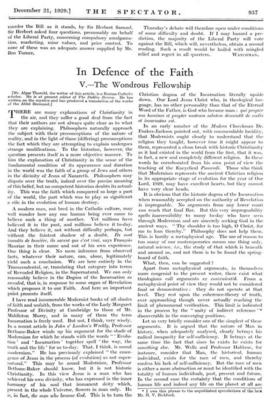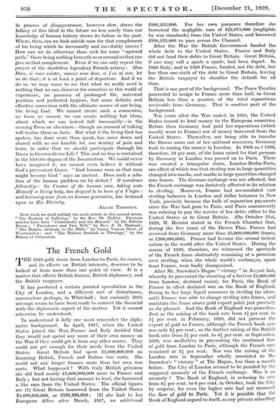In Defence of the Faith
V.—The Wondrous Fellowship
[Mr. Alger Thorold, the writer of this article, is a Roman Catholic scholar. He is at present editor of The Dublin Review. He has written on the mystics and has produced a translation of the works of the Abbe Bremond.J THERE arc many explanations of Christianity in the air, and they suffer a good deal from the fact that their authors are not always quite clear as to what they are explaining. Philosophers naturally approach the subject with their preconceptions of the nature of reality-, and in the light of those (differing) preconceptions the fact which they are attempting to explain undergoes strange modifications. " To the historian, however, the question presents itself in a more objective manner. To him the explanation of Christianity in the sense of the fundamental condition of its appearance and duration in the world was the faith of a group of Jews and others in the divinity of Jesus of Nazareth. Philosophers may dispute over the truth, indeed over the -precise meaning of this belief, but no competent historian doubts its actual- ity. This was the faith which conquered so large a part of the world, the part which was to play so significant a role in the evolution of human destiny.
A modern man, not bred in the Catholic culture, may well wonder how any one human being ever came to believe such a thing of another. Yet millions have believed it in the past, and millions believe it to-day. And they believe it, not without difficulty perhaps, but without the faintest shadow of a doubt. Ile sont Mond& de lumiire, ifs savent que c'est vrai, says Francois Mauriac in their name and out of his own experience. One thing is clear. No mere inference from observed facts, whatever their nature, can, alone, legitimately yield such a conclusion. We are here entirely in the Transcendental, or, translating that category into terms of Revealed Religion, in the Supernatural. We can only reasonably believe in the Dogma of the Incarnation as revealed, that is, in response to some organ of Revelation which proposes it to our Faith. And here an important point presents itself.
I have read innumerable Modernist books of all shades of faith and unfaith, from the works of the Lady Margaret Professor of Divinity at Cambridge to those of Mr. Middleton Murry, and in many of them the term Incarnation is freely used. But not, I think, very wisely. In a recent article in John o' London's Weekly, Professor Bethune-Baker winds up his argument for the shade of Modernism for which he stands with the words " Evolu- tion ' and ' Incarnation ' together spell the way, the truth and the life ' for us to-day. That, I think, is sound modernism." He has previously explained " the emer- gence of Jesus in the process (of evolution) as not super- natural." This may be sound Modernism, Professor Bethune-Baker should know, but it is not historic Christianity. In this view Jesus is a man who has achieved his own divinity, who has expressed in the inner harmony of his soul that immanent deity which, present in the whole Universe, flowers in man only. He is,, fact, the man who became God. This is to turn the Christian dogma of the Incarnation literally upside down. Our Lord Jesus Christ who, in theological lan- guage, has no other personality than that of the Eternal Word of the Father, is God who became man : qui propter nos homines et propter nostram salutem descendit de coelis et incarnatus est.
In an early number of the Modern Churchman Dr. Foakes-Jackson pointed out, with commendable lucidity, that Modernists ought clearly to understand that the religion they taught, however true it might appear to them, represented a clean break with historic Christianity as it had existed in the world from the first, that it was, in fact, a new and completely different religion. In these words he corroborated from his own point of view the teaching of the Encyclical Pascendi. Those who think that Modernism represents the ancient Christian religion in its appropriate stage of evolution for the year of Our Lord, 1929, may have excellent hearts, but they cannot have very clear heads.
It is obvious that the historic dogma of the Incarnation when reasonably accepted on the authority of Revelation is impregnable. No arguments from any lower court can reach that final Bar. But this very impregnability spells inaccessibility to many to-day who have seen through Modernism and are sincerely seeking God in the ancient ways. " Thy shoulder is too high, 0 Christ, for me to lean thereby." Philosophy does not help them.
This is hardly a metaphysical age. The use of reason to too many of our contemporaries means one thing only, natural science, i.e., the study of that which is beneath and around us, and not there is to be found the spring- board of faith.
What, then, can be suggested ?
Apart from metaphysical arguments, in themselves more congenial to the present writer, there exist what theologians call arguments ex convenientid. From a metaphysical point of view they would not be considered final or demonstrative : they do not operate at that level. They rest upon the coherence-theory of truth, ever approaching though never actually reaching the limit of phenomenal verification. This limit is indicated in the process by the " unity of indirect reference "* discoverable in the converging positions.
Let us very briefly consider one of the simplest of these arguments. It is argued that the nature of Man in history, when adequately analysed, clearly betrays his radical incapacity for self-sufficiency. It betrays at the same time the fact that since he exists lie exists for something else. Mr. Wells and Professor Haldane, for instance, consider that Man, the historical, human individual, exists for the race of men, and thereby confess his lack of self-sufficiency. But the race of men is either a mere abstraction or must be identified with the totality of human individuals, past, present and future. In the second case the certainty that the conditions of human life and indeed any life on the planet at all are * I owe this phrase to the unpublished speculations of the late Mr. H. V. Bickford. in process of disappearance, however slow, shows the fallacy of this ideal in the future no less surely than our knowledge of human history shows its failure in the past. Where, then, can we look outside man for that complement of his being which he incessantly and inevitably craves ? How can we do otherwise than seek for some " upward path," there being nothing beneath us or around us that can give us that complement. Even if we can only repeat the prayer of the doubtless legendary French actress : Mon Dieu, si vow existez, sauvex man dm, si en ai une, let us do that; it is at least a point of departure. And if we do so, we may come to see that what we really need is nothing that we can discover for ourselves in this world of experience, no panacea of prolonged life, universal pacifism and perfected hygiene, but some definite and effective connexion with the ultimate source of our being, the living God. We cannot create such a connexion, we know we cannot, we can create nothing but ideas, about which we can indeed talk incessantly—in the evening Press or elsewhere—though no amount of talking will realize them as facts. But what if the living God has spoken, has done more than speak, has come down and shared with us our humble lot, our destiny of pain and tears, in order that we should participate through his Grace in his own divine Life ? This and no less is contained in the historic dogma of the Incarnation. We could never have imagined it, we cannot even believe it without God's prevenient Grace. " God became man so that man might become God " says an ancient. Does such a solu- tion of the human problem err by defect ? 0 wondrous fellowship : the Creator of the human race, taking unto Himself a living body, has deigned to be born of a Virgin : and becoming man from no human generation, has bestowed upon us His Divinity.
ALGAR TROROLD.
Next week we shall publish the sixth article in this second series, " The Mystery of Suffering," by the Rev. Dr. Maltby. Previous articles have been " Christianity and the Beyond," by Dr. Edwyn Bevan ; " Providence and Free Will," by Rev. F. H. Brabant ; " The Modern Attitude to the Bible," by Canon Vernon Storr, of Westminster ; and " The Modern Outlook in Theology," by the Bishop of Gloucester.



































 Previous page
Previous page